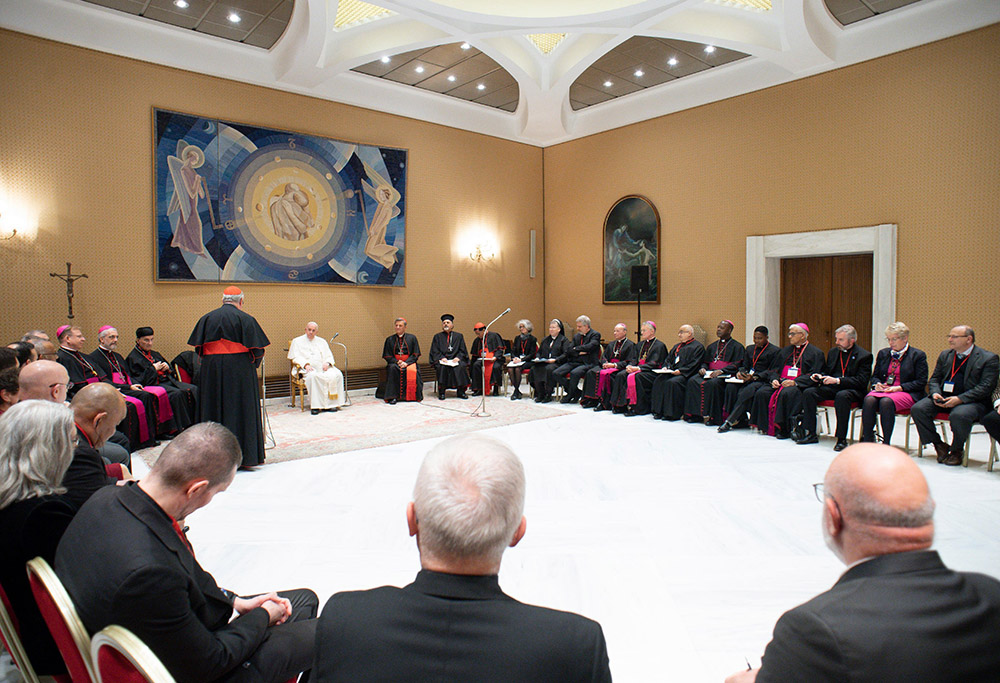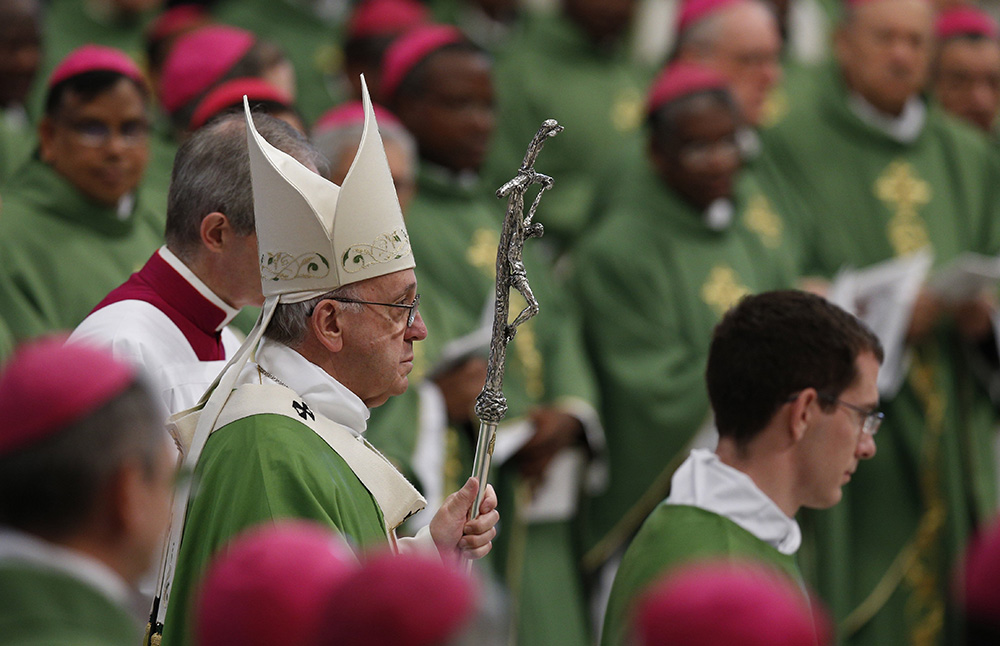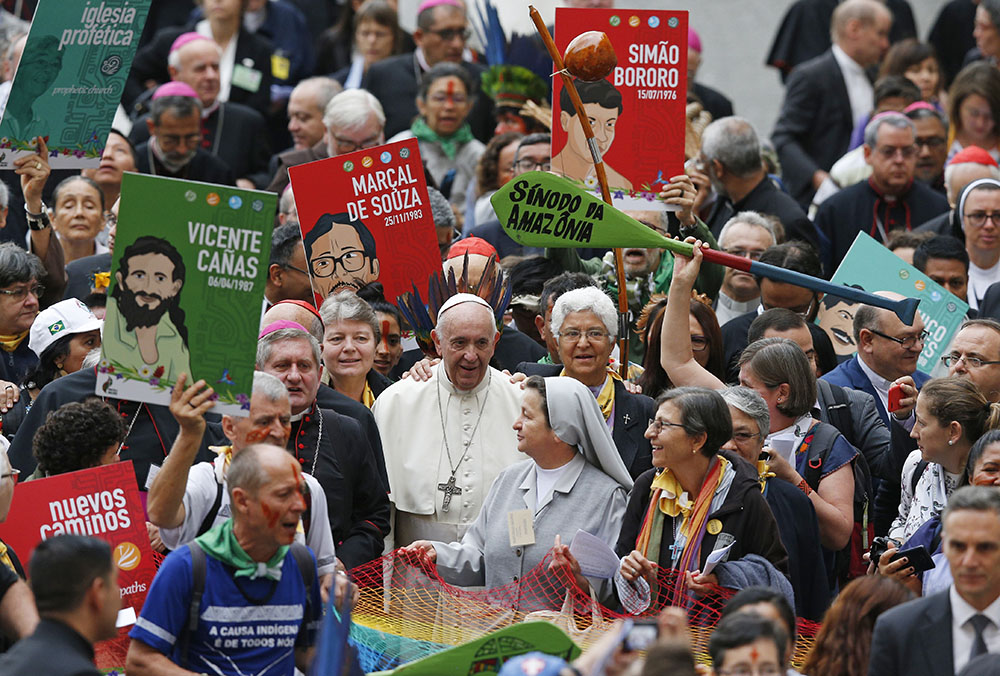
Pope Francis listens as Cardinal Jean-Claude Hollerich of Luxembourg, relator general of the Synod of Bishops, speaks during a meeting with the presidents and coordinators of the regional assemblies of the Synod of Bishops at the Vatican Nov. 28, 2022. (CNS/Vatican Media)
In assessing the pontificate of Francis at the 10-year mark, we have looked at his self-understanding of the papal role as a pastor, his placement of mercy at the heart of his teaching, and his efforts to reform the church. All three themes find their fullest ecclesial expression in Francis' commitment to synodality.
Commonweal senior writer Paul Baumann recalled a written symposium sponsored by The Wall Street Journal in the weeks after Pope Benedict XVI resigned but before Francis was elected. Several Catholic writers (including myself) were asked what the Catholic Church needed in its new pope. George Weigel said we needed a "culture warrior." In a sense, Weigel got his wish, albeit not in the sense he intended!
Baumann's submission in 2013, however, was pretty close to the mark. He said he wanted a pope who was "a bit of a Californian." This was a reference to Walker Percy's famous claim that Catholics had to choose between Rome and California, with the latter representing all the aspects of the modern world traditional Catholics disliked.
Baumann continues: "I thought that was a false choice. The Church would have to come to terms with everything California represented; retreating from the modern world was not an option."
Advertisement
"In conclusion, I quoted the philosopher Charles Taylor," Baumann adds. "Rome proposes 'too many answers choking off questions and too little sense of the enigmas that accompany a life of faith; these are what stop a conversation from ever starting between our Church and much of our world.' "
Baumann was right: We needed a pope who would stop "choking off questions" and possess a better sense of "the enigmas that accompany a life of faith," and that is what we got.
The synodal process has exposed this chasm. On the one side are those who believe they have mastered all the riddles of salvation, that the catechism is the last word on Christian life, and that asking questions the catechism does not address or exhaust is dangerous. On the other side are those who understand that the life of faith, by very reason of its transcendence, is always going to exceed our grasp, especially our intellectual grasp.
Each side has subgroups. Among the latter side, there are those who really do let the enigmas overwhelm, and they either ignore or manipulate the tradition without which Catholicism is not Catholicism. Others place those enigmas in constant tension with the tradition, recognizing there are limits to its elasticity. Among the former side, there are those who raise prudential concerns about the synodal process, and those who reject it out of hand, fearing that it will sow confusion.
The synodal process will work only if the subgroups that ignore or reify the tradition are converted or marginalized. The center will hold if it can be heard.

Pope Francis arrives to celebrate the closing Mass of the Synod of Bishops on the family in St. Peter's Basilica at the Vatican Oct. 25, 2015. (CNS/Paul Haring)
Pope Francis' commitment to a more synodal church was evidenced early on when he extended the 2014 synod on the family to include a second year. A couple of months after the October 2014 synod, the pope discussed what had happened at a general audience. As Cindy Wooden reported at the time:
"Some of you might ask me, 'But, father, didn't some of the bishops fight?' I wouldn't say 'fight,' but they did speak strongly, that's true. This is the freedom that exists in the church," the pope said to the applause of the crowd gathered in St. Peter's Square.
"I asked the synod fathers to speak with frankness and courage and to listen with humility — to say everything that was in their hearts with courage," he said. "There was no pre-censorship at the synod. None. Everyone could, or better, had to say what was in his heart, what he really thought."
This was a far cry from synods during the pontificate of John Paul II. The Polish pontiff was famous for reading books while the bishops read speeches.
"Amid all the lobbying and armchair analysis, it's important to step back and realize that in the three decades before Francis was elected pope, bishops, priests and theologians could have been investigated, censured, silenced or fired for many of the ideas that were being openly discussed at the synod," David Gibson noted at the conclusion of the 2014 synod. "That is perhaps the real earthquake, and it's one that Francis himself wanted."
The synodal process will work only if the subgroups that ignore or reify the tradition are converted or marginalized. The center will hold if it can be heard.
"The pope's attention to the concrete reform of ecclesiastical structures has been uneven but not without promise," Boston College theology professor Richard Gaillardetz observed in a recent essay here at NCR. "He has made far greater use of episcopal synods than did his postconciliar predecessors. He has reconfigured the preparation for and conduct of those synods, considerably expanding participation. He has enhanced processes of consultation and created a space for honest discussion and even disagreement among synodal participants."
Gaillardetz lamented that the pope had not acted on the recommendations of the Amazon synod that the church ordain women to the diaconate and older, non-celibate men to the priesthood.
As Francis later explained to Fr. Antonio Spadaro: "There was a discussion ... a rich discussion ... a well-founded discussion, but no discernment, which is something different from arriving at a good and justified consensus or relative majority."
The pope continued: "We must understand that the Synod is more than a parliament; and in this specific case it could not escape this dynamic. On this subject it has been a rich, productive and even necessary parliament; but no more than that. For me this was decisive in the final discernment, when I thought about how to shape the exhortation."

Pope Francis walks in a procession at the start of the Synod of Bishops for the Amazon at the Vatican Oct. 7, 2019. (CNS/Paul Haring)
I hope the leaders of the synodal process help people grasp these distinctions that are vital if we are to engage in the synodal process the pope wants, and to avoid massive disappointment in the near future.
A key to the answer is found in a comment earlier in that same Civiltà Cattolica article. Spadaro writes: "And above all, there is no discernment regarding ideas, even ideas of reform, but on the real, on stories, on the concrete history of the Church, because reality is always superior to the idea" (emphasis in original).
There are echoes here of a quote about pastoral intuitions versus theological reasoning by philosopher Henri Bergson that Archbishop Christophe Pierre, the apostolic nuncio, cited in a recent address at Sacred Heart University. Still, the claim "reality is always superior to the idea" sounds to me like, well, an idea. I would like to know more. I suspect millions of Catholics feel the same way.
What is clear is that synodality is a kind of apotheosis of Francis' pontificate. It depends on a proximity to the people of God that he has insisted is essential to effective pastoral leadership and governance. It involves patient listening to people with whom we disagree, thereby demanding mercy. It embodies the kind of personal reforms that make structural reforms possible.
If it takes, and that is an enormous "if," synodality will be the outstanding characteristic of this fascinating and energetic papacy.





